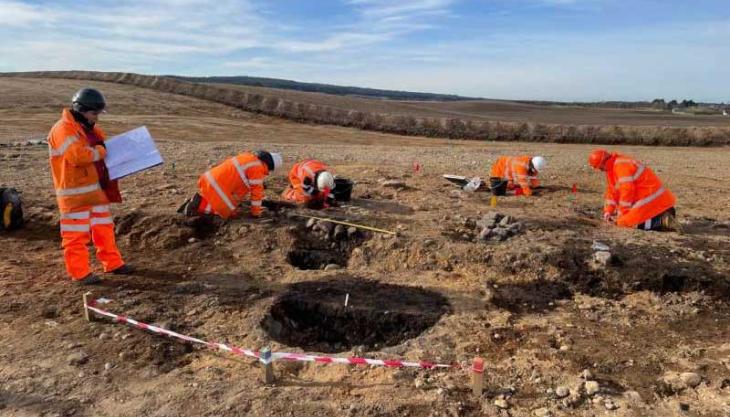Significant archaeological discovery at Lochinver Quarry

Recent excavations at Tarmac site in north-east Scotland indicate evidence of Roman invasion
A RECENT archaeological dig at a Tarmac quarry in Scotland has found evidence of a former ironworking settlement which may have helped Caledonian tribes to fight against the Romans, with some findings dating back to around 2,000 BCE.
The multi-phase Bronze Age through to Iron Age site has been discovered during pre-quarrying investigations at Lochinver Quarry, near Elgin, Moray, thanks to funding from Tarmac and support from Archaeological Research Services Ltd (ARS Ltd) and Aberdeenshire Council Archaeology Service.
The archaeologists have found numerous buildings dating back to the Bronze Age and Iron Age, along with features such as iron furnaces, domestic hearths, rubbish pits, storage pits, and timber enclosures. Evidence of ironworking at this large scale is rare, marking it as an exciting and fascinating find for the team.
Radiocarbon dating of some artefacts goes back to the end of the first century AD and suggest the settlement was abandoned after burning. The archaeology team suspect this might indicate evidence of the Roman battle of Mons Graupius, the exact location of which remains a mystery.
Commenting on the finds, Stephen Cowan, estates manager at Tarmac, said: ‘This is a genuinely exciting find unlocked by the quarry project and by carrying out proper and professional investigation in advance. The expertise and enthusiasm of the archaeology team have really brought things to life and engaged everyone. It has also been good to share the findings on the ground with the wider community and everyone is keen to see what else will be revealed in the later laboratory analysis.’
Dr Clive Waddington of ARS Ltd and director of the site, added: ‘This is a rare and important site which provides an exciting opportunity to further understanding of later prehistoric life, early metalworking, and the impact of Rome in the far north of Britain. This is a topic that is still relatively poorly understood and one that is in need of new evidence, such as that discovered at Lochinver, to shed new light on these important, though neglected, parts of our history.’
This site will provide important new evidence that could help address questions surrounding the battle of Mons Graupius, what the impact of the Roman Invasion was on the Iron Age tribes of Scotland, and what the legacy of this was for local communities.
Laboratory analysis forms the next stage of this work, which hopes to provide more information on these subjects. The fieldwork has also included an opportunity for local volunteers and school children to be involved in these exciting discoveries on the Tarmac site.
Bruce Mann, archaeologist at Aberdeenshire Council, said: ‘The remains from Lochinver Quarry are an exciting discovery with huge potential to improve our understanding of Bronze Age and Iron Age life in north-east Scotland. We now look forward to the programme of post-excavation analysis, which will reveal much more about the date, function, and significance of these structures.’









